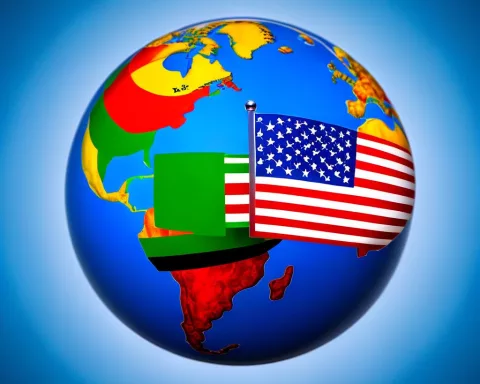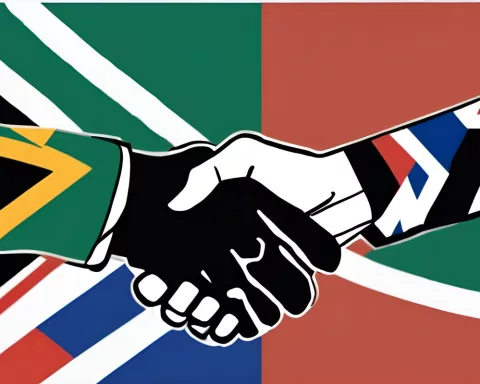President Cyril Ramaphosa is on an important mission to improve South Africa’s relationship with the United States. He wants to turn past disagreements into a strong partnership that helps both countries grow. While facing challenges at home, like land reforms and internal groups seeking foreign help, Ramaphosa believes in solving problems together without outside interference. His goal is to create a friendship based on mutual respect and shared interests, ensuring South Africa plays a vital role in the global community. Through unity and teamwork, he hopes to build a brighter future for his country.
What is the purpose of Ramaphosa’s diplomatic mission with the United States?
President Cyril Ramaphosa’s diplomatic mission aims to redefine South Africa’s relationship with the United States by addressing economic and diplomatic challenges. He seeks to transform existing tensions into a mutually beneficial partnership, emphasizing self-reliance, national sovereignty, and the importance of collaborative solutions.
Navigating Diplomatic Challenges
President Cyril Ramaphosa of South Africa embarks on a pivotal diplomatic initiative aimed at redefining the country’s relationship with the United States. This endeavor is marked by a backdrop of intricate diplomatic challenges and aims to achieve comprehensive economic and diplomatic agreements. Tensions between the two nations have escalated due to disagreements over domestic and international policies, creating a complex environment for negotiations. Despite these hurdles, Ramaphosa remains steadfast in his pursuit to transform the existing frictions into a partnership that benefits both countries.
The strain in US-South African relations largely stems from disputes over land reform policies and foreign policy decisions. These disagreements have led the United States to take measures such as ceasing most foreign aid and opting out of the Group of 20 meetings in South Africa. At a conference hosted by a leading American bank in Johannesburg, Ramaphosa voiced his optimism about overcoming these challenges. He emphasized that his planned visit to Washington is not merely to defend South Africa’s positions but to establish a meaningful partnership grounded in mutual interests, suggesting that such a deal is within reach.
Historically, US-South African relations have been complex. During the apartheid era, the United States faced pressure to impose economic sanctions on South Africa. However, the transition to democracy created opportunities for stronger ties. Despite the current discord, which echoes past periods of tension, Ramaphosa’s efforts to secure a new agreement reflect an understanding of the global economy’s interconnectedness. Strategic alliances have the potential to promote stability and growth, aligning with Ramaphosa’s vision of a renewed partnership.
Addressing Domestic Dynamics
While engaging in international diplomacy, Ramaphosa also focuses on domestic challenges in South Africa. He criticized certain local groups seeking external intervention in national affairs, particularly targeting the Afrikaner rights group AfriForum and the trade union Solidarity. These organizations recently traveled to Washington to discuss issues related to land expropriation, education reforms, and violence against specific communities. Ramaphosa views their actions as a threat to national unity and sovereignty.
At a national education conference, Ramaphosa advocated for self-reliance and internal dialogue to address South Africa’s challenges. He urged citizens to solve problems independently rather than relying on foreign intervention, reinforcing the importance of sovereignty and national agency. This stance highlights a commitment to addressing complex social and economic issues through domestic collaboration and solutions.
The dynamic between domestic advocacy groups and international diplomacy underscores the complexities of South African politics. AfriForum and Solidarity’s actions reflect diverse perspectives on governance and reform. Some view international engagement as a strategic advantage, while others see it as compromising national integrity. Ramaphosa’s emphasis on internal problem-solving echoes historical movements in South Africa that valued unity and self-reliance in overcoming adversity.
Cultural and Social Evolution
Amid the political intricacies, South Africa’s cultural and social landscapes continue to evolve. The country’s rich artistic and cultural heritage provides insights into its journey toward reconciliation and unity. South African literature, music, and art frequently explore themes of overcoming division, serving as both reflections and catalysts for societal change. These cultural expressions align with Ramaphosa’s call for unity and collaborative problem-solving, reinforcing the nation’s ongoing commitment to reconciliation.
As South Africa navigates its path on the international stage, balancing internal cohesion with external diplomacy remains vital. Ramaphosa’s vision for a comprehensive agreement with the United States symbolizes the broader aspiration for growth and stability. The goal is to redefine relationships in a way that honors sovereignty while embracing global partnership opportunities.
The Path Forward
The evolving narrative between South Africa and the United States embodies resilience and potential. With careful negotiation and a commitment to mutual understanding, there is an opportunity to transform current tensions into a foundation for future cooperation. The dialogue Ramaphosa envisions promises not only economic benefits but also a reaffirmation of South Africa’s role on the global stage. It showcases the nation’s capacity to navigate challenges while fostering meaningful international relationships.
In conclusion, Ramaphosa’s diplomatic mission reflects his determination to strengthen ties between South Africa and the United States. By addressing both international and domestic challenges, he aims to lay the groundwork for a partnership that transcends current frictions and promotes long-term stability and growth. As South Africa continues to evolve, the balance between internal cohesion and external diplomacy will remain key to its success on the global stage.
FAQ: Ramaphosa’s Diplomatic Mission with the United States
What is the purpose of Ramaphosa’s diplomatic mission with the United States?
President Cyril Ramaphosa’s diplomatic mission aims to redefine South Africa’s relationship with the United States by addressing economic and diplomatic challenges. He seeks to transform existing tensions into a mutually beneficial partnership, emphasizing self-reliance, national sovereignty, and the importance of collaborative solutions.
What are the main challenges faced by Ramaphosa in improving US-South Africa relations?
The main challenges include disagreements over land reform policies, foreign policy decisions, and the resulting strain in diplomatic ties. These issues have led to the United States ceasing most foreign aid and opting out of Group of 20 meetings in South Africa. Overcoming these hurdles is crucial for Ramaphosa’s vision of a renewed partnership.
How does Ramaphosa view local advocacy groups seeking foreign intervention?
Ramaphosa criticizes local groups, like AfriForum and Solidarity, that seek external intervention in national affairs, viewing their actions as a threat to South African unity and sovereignty. He emphasizes the importance of self-reliance and internal dialogue to address the country’s challenges, advocating for problem-solving without foreign interference.
What historical context influences current US-South Africa relations?
US-South African relations have been complex, particularly during the apartheid era when economic sanctions were imposed. The transition to democracy allowed for stronger ties, but current tensions echo past periods of friction. Ramaphosa’s efforts to secure a new agreement reflect an understanding of the interconnectedness of the global economy and the need for strategic alliances.
How does South Africa’s cultural landscape play a role in Ramaphosa’s diplomatic efforts?
South Africa’s rich artistic and cultural heritage serves as a reflection of its journey towards reconciliation and unity. Literature, music, and art often explore themes of overcoming division, aligning with Ramaphosa’s calls for unity and collaborative problem-solving. These cultural expressions reinforce the nation’s commitment to reconciliation and societal change.
What is Ramaphosa’s vision for the future of US-South Africa relations?
Ramaphosa envisions a comprehensive agreement with the United States that fosters economic benefits and reaffirms South Africa’s role on the global stage. His approach symbolizes a broader aspiration for growth and stability while emphasizing the importance of balancing internal cohesion with external diplomacy for long-term success.












